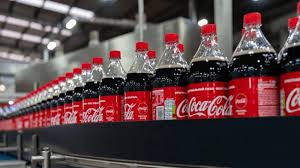The Coca-Cola System in Nigeria, comprised Coca-Cola Nigeria Limited and its authorized bottler, Nigeria Bottling Company (NBC), announced plans to expand its investments in Nigeria.
Over the next five years, with a predictable and enabling environment in place, the System plans to accelerate its investments in Nigeria to reach US$ 1 billion.
The investment builds on the System’s long-standing involvement in Nigerian communities. Over the last 10 years, Coca-Cola Hellenic Bottling Company, known locally as Nigerian Bottling Company, has invested $1.5 billion in Nigeria.
With the announcement, the Coca-Cola System plans to more than double its rate of investment over the next 5 years.
This investment underscores the Coca-Cola System’s continued confidence in the Nigerian market and its promising future economic prospects. The investment is expected to support various value chain areas, including suppliers, distributors, retailers, and recyclers.
According to the report distributed by the APO Group on behalf of Coca-Cola,
the announcement was made at the State House in Nigeria, where a Coca-Cola System delegation was hosted by President Bola Ahmed Tinubu.
In addition to the Coca-Cola System leadership team in Nigeria, the delegation was comprised of international Coca-Cola System representatives: John Murphy, President and Chief Financial Officer of The Coca-Cola Company; Zoran Bogdanovic, Chief Executive Officer of Coca-Cola Hellenic Bottling Company; Henrique Braun, EVP and President, International Development of The Coca-Cola Company; Luisa Ortega, President of Coca-Cola’s Africa Operating Unit; and Naya Kalogeraki, Chief Operating Officer of Coca-Cola Hellenic Bottling Company.
It added that following the meeting, Murphy indicated that “the investment highlights our system’s efforts to drive scalable initiatives while also preserving the value of local relevance. Coca-Cola has been an integral part of the African continent for over 96 years and today’s investment in Nigeria reiterates our optimism about the continent.”
Bogdanovic commented, “The Coca-Cola System has been part of Nigerian communities for over 70 years and believes in the strength and continued potential of the market. We are excited to announce this investment, which demonstrates our dedication to fostering economic growth and creating job opportunities in the country.”
“Our investment goes beyond business growth; it’s about contributing to the well-being of the communities we call home. We foresee significant social and economic advancements, which is why we continue to invest in our business operations and community programs in Nigeria,” concluded Bogdanovic.
Ortega emphasized the importance of collaboration to create a stable operating environment. “By working in partnership with the government and other stakeholders, we can drive sustainable development and economic empowerment. Our collective efforts can create a lasting positive impact on the communities we serve.”
In his remarks, President Tinubu commended Coca-Cola for its long-standing partnership with Nigeria and for promoting investment opportunities that have employed over 3000 people across nine production facilities.
”We are business-friendly, and as I said at my inauguration, we must create an environment of easy-in and easy-out for businesses. We are building a financial system where you can invest, re-invest, and repatriate all your dividends. I have a firm belief in that,” he said.
Coca-Cola has a rich legacy of refreshing Africa and making a difference across the continent for over 96 years. In Nigeria, for 73 years, the Coca-Cola System has been an integral part of the local economy, employing over 2,800 people across 8 production plants.
A recent economic impact study, conducted by Steward Redqueen, found that for every job created by the Coca-Cola System, an additional 31 jobs are supported across the country. The Coca-Cola System continues to invest in the socio-economic development of Nigeria as it scales up different sustainability interventions by investing more in empowering young people, provision of clean potable water supply, and the support for a stronger plastics waste collection infrastructure in different parts of the country.
GIK/APA


